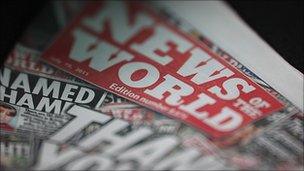Press regulation: Royal charter risks freedom - editors
- Published
- comments
Bob Satchwell on proposals: "You can't have any kind of political interference in a free press"
Press freedom is being put at risk by the government's proposed royal charter, external on newspaper regulation, the head of the Society of Editors has warned.
Bob Satchwell said issues with the charter meant "you wouldn't have a free press any longer".
Shadow culture secretary Harriet Harman said newspapers had nothing to fear from the all-party draft charter.
Independent self-regulation is to be brought in after recommendations by the Leveson Inquiry.
Mr Satchwell, executive director of the Society of Editors, external, which draws its members from across the press and TV industry, told the BBC there were "key problems" with the charter.
He said: "You can't have a new system of regulation which is drawn up by and imposed by politicians.
"The things which are being proposed at the moment would be totally unconstitutional in the US and other countries.
"People in other countries, not just journalists, are looking at what's going on here at the moment with horror."
Ms Harman - who said the "last thing" the government wanted was a situation "where politicians control the press" - urged newspapers to "try out" the proposed system.
"It's quite ironic because a system that's quite like this operates in Ireland and applies to our UK press for their Irish editions - they sign up to it and it hasn't caused any problems of politicians controlling the press."
The Industry Steering Group, which represents national, regional and local newspaper publishers, said it would "closely study" the proposals.
However, it said it was "impossible" to see that a regulator "imposed and controlled by politicians" would be "voluntary or independent".
"This remains a charter written by politicians, imposed by politicians and controlled by politicians," it said in a statement.
Many in the press are keen to get their own regulator set up as soon as possible.
Daily Mail editor-in-chief Paul Dacre said the row between Ed Miliband and his newspaper over an article about the Labour leader's late father showed why politicians should not be involved in press regulation.
Mr Dacre also claimed the "hysteria" which followed Geoffrey Levy's article, external was "symptomatic of the post-Leveson age".
In an article published in the Guardian, external and in his own paper, external, he said: "Some have argued that last week's brouhaha shows the need for statutory press regulation. I would argue the opposite.
"The febrile heat, hatred, irrationality and prejudice provoked by last week's row reveals why politicians must not be allowed anywhere near press regulation."
Political anger

Press regulation faced intense scrutiny in the wake of phone hacking at the News of the World
Media lawyer Mark Lewis, who represented some of the victims of phone hacking, said newspapers had "failed completely with self-regulation and now they're telling the public this is statutory regulation, this is control over what's in the paper".
"It's nothing like that at all," he added.
Former News of the World executive editor Neil Wallis told the BBC there was no chance of the charter being implemented.
He said: "The idea that politicians can have any say in any way in the running of a free press is simply laughable."
He added there had already been a "chilling effect" on the press following the Leveson Inquiry.
Cross-party political agreement on regulation comes after months of wrangling since Sir Brian Leveson published his report into press ethics and practices.
The Leveson Inquiry was set up amid public and political anger at the extent of phone hacking by journalists, first exposed when it emerged that the now-closed News of the World had accessed the voicemail messages of murdered teenager Milly Dowler.
The all-party draft proposals include plans for:
A small charge for arbitration for people seeking redress from newspapers - as an alternative to expensive libel courts
An opt-out for local and regional newspapers
More involvement in decision making for the press and media industry
The all-party charter states that changes to regulation could be made only with a two-thirds majority in Parliament.
Culture Secretary Maria Miller said the deal would safeguard the freedom of the press and the future of local newspapers.
Hacked Off, which campaigns on behalf of victims of press intrusion, said changes to the draft proposals meant there was no reason for the press to refuse to back the charter.
The proposals will be put to the Privy Council for final agreement on 30 October.